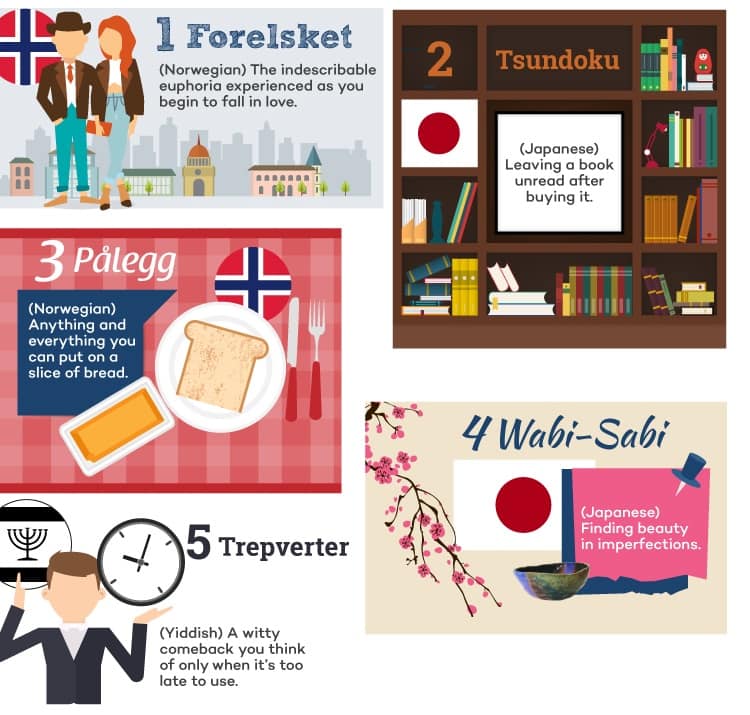Infographic: Fifty Words Which Should Exist in English


All this borrowing (and not to mention outright theft) has given us a language whose rules would best be described as crazy, and the following infographic will only make things worse.
It details over 40 words from other languages which don’t quite translate into English, as well as a handful of words which do have English equivalents or have already been co-opted.
Some of the words, such as schadenfreude and tsundoku, are already used conversationally, while fika (Swedish) sounds like it falls somewhere between hanging out and the English concept of an afternoon tea.
Do you see any words you would like to use in a conversation?


Comments
Ronny Fritz May 30, 2016 um 7:29 am
Cute 🙂
But number 48 is not quite right. The meaning of Schnapsidee is more like: "it did sound ingenious when you where drunk, but now that you are sober it’s plain stupid" 🙂 So usually it’s used, when someone thought he was clever but in fact f*cked things up 🙂 Then the boss would ask: Who had this "Schnapsidee"?
Nate Hoffelder May 30, 2016 um 7:35 am
Or, in English we might ask "Were you drunk when you came up with this plan?"
Which is in fact something I have been asked.
Fjtorres May 30, 2016 um 7:42 am
Back in the dot-com era John Dvorak in his columns would talk of "white line" schemes when referring to obviously crazy and stupid/non-workable ventures. As in: hatched after sniffing a few white lines of cocaine.
Kinda like Agency part deux or Oyster/Scribd doing near-full payouts.
Common sense is pretty uncommon, really.
Nate Hoffelder May 30, 2016 um 7:47 am
Common sense is a null term. It doesn’t mean anything.
Fjtorres May 30, 2016 um 11:32 am
It used to refer to a minimum level of rationality that could be expected from an adult, based on things that are common knowledge: things like not going surfing in hurricane weather or sticking a finger in a light bulb socket.
Darwin awards prove how uncommon it has become.
Nate Hoffelder May 30, 2016 um 12:07 pm
No, it never actually meant that.
"Common sense" is and always has been a synonym for "the assumption of shared culture or knowledge". When used, it says nothing about the topic at hand and instead merely indicates that the speaker is assuming something to be true.
What is assumed to be true can range from factual info (such as math or geography) to erroneous and possibly racist/sexist/bigoted assumptions like "it’s common sense that all blacks are (blank)".
I came to this revelation when MobileRead was discussing whether to ban shortened URLs. One moderator said that it was common sense that you can’t trust the shortened URL, and it made me realize that he had simply assumed it to be true.
In my opinion, "common sense" should be regarded as a logical fallacy, perhaps a thought terminating cliche. That is how I see it used most often.
puzzled May 30, 2016 um 4:48 pm
In English, we also call this a Brainfart…
Richard Wong May 30, 2016 um 4:42 pm
Number28 "bakku-shan" is actually a Japanese creation made up of two European words, bakku from "back" in English and shan or more correctly shen from "schön" in German.
Sharon Reamer May 31, 2016 um 8:51 am
That’s really funny. Are there a lot of words like that in Japanese – composites from other languages?
There's No Such Thing as Common Sense, and There Never Was | The Digital Reader May 30, 2016 um 7:02 pm
[…] start with the comment that set me off. Felix Torres left a comment explaining […]
Hannah Steenbock May 31, 2016 um 4:16 am
They didn’t get some German words quite right… but then, the concepts don’t exist in English.
11: We don’t use the word "Luftmensch". There is one close to it that’s "Luftikus", which is a person who is not very grounded in reality.
13: Extrawurst – that means someone is getting special treatment which might slow things down, and might or might not be justified. But the focus is on the special (extra) treatment. It literally means grilling an "extra" = special sausage for someone.
17: Waldeinsamkeit. *shudder* I’ve seen that one appear in memes, and it just does not exist in German. Oh, yes, we love the forest and romanticize about it, but not with that word.
24: Well, Ronny took care of that one.
It is great fun to see what expressions and concepts other languages use. To me, that’s one of the greatest thing about learing a foreign language.
Sharon Reamer May 31, 2016 um 7:23 am
Thanks Hannah,
I was just sitting here and wondering why I’d never ever heard anyone use Waldeinsamkeit in the 25 years I’ve lived in Germany.
Also, Extrawurst seemed off to me too, but I guess that’s why some of the words are so hard to translate.
On the other hand – I absolutely love the word Verschlimmbessern even though I don’t think I’ve ever used it in a conversation.
Also, 38. Gezellig also works in German (gesellig) 🙂
Nate Hoffelder May 31, 2016 um 8:24 am
Yes, thanks, Hannah.
Paul Biba’s eBook, eLibrary and ePublishing news compilation for week ending Saturday, July 9 | The Digital Reader July 9, 2016 um 8:14 am
[…] 50 untranslatable words from around the world (The Digital Reader) […]